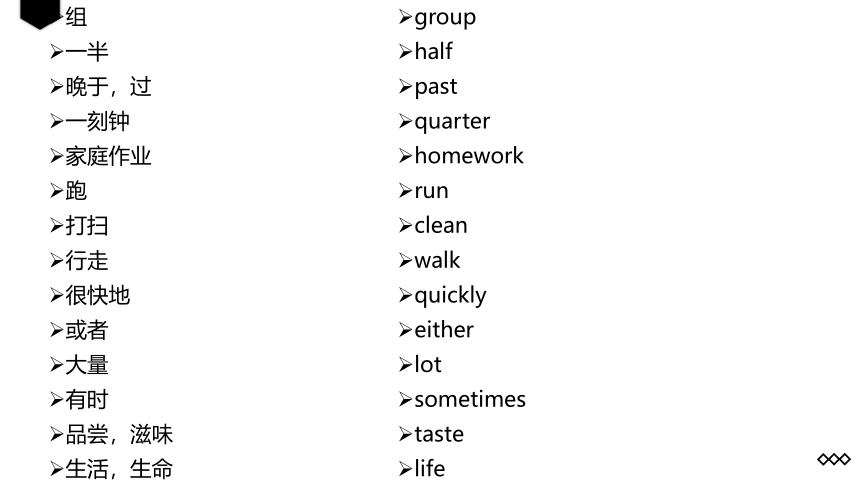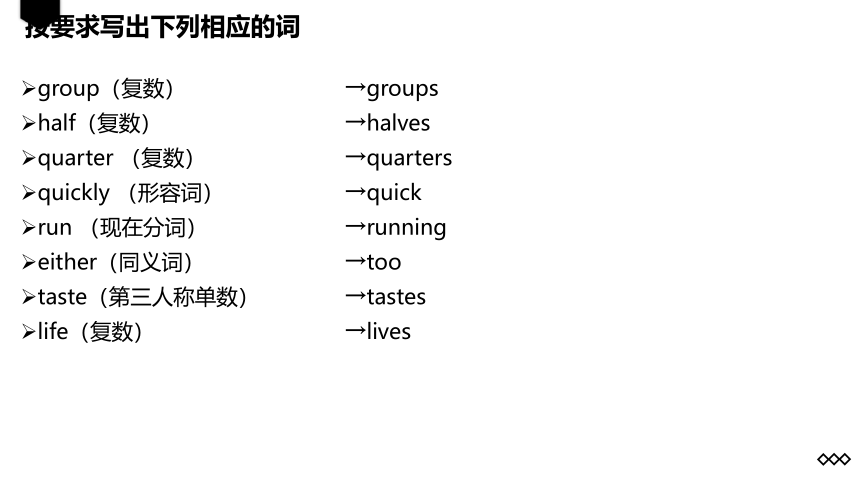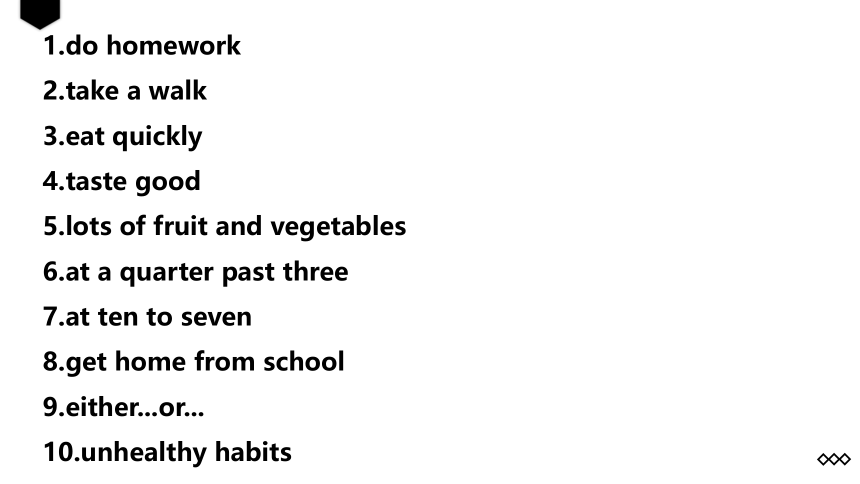Revision for Unit 2 What time do you go to school?SectionB(共有PPT19张)
文档属性
| 名称 | Revision for Unit 2 What time do you go to school?SectionB(共有PPT19张) |  | |
| 格式 | zip | ||
| 文件大小 | 274.5KB | ||
| 资源类型 | 教案 | ||
| 版本资源 | 人教新目标(Go for it)版 | ||
| 科目 | 英语 | ||
| 更新时间 | 2022-02-20 10:16:26 | ||
图片预览







文档简介
(共19张PPT)
Dave 七年级英语组
Unit2 SectionB
Review
2022
1
SectionB 重点单词
Key Words
组
一半
晚于,过
一刻钟
家庭作业
跑
打扫
行走
很快地
或者
大量
有时
品尝,滋味
生活,生命
group
half
past
quarter
homework
run
clean
walk
quickly
either
lot
sometimes
taste
life
group(复数)
half(复数)
quarter (复数)
quickly (形容词)
run (现在分词)
either(同义词)
taste(第三人称单数)
life(复数)
按要求写出下列相应的词
→groups
→halves
→quarters
→quick
→running
→too
→tastes
→lives
02
SectionB 重点短语
Key Phrases
1.做作业
2.散步
3.吃得快
4.尝起来好
5.大量的水果和蔬菜
6.在三点一刻
7.差十分钟七点
8.放学回家
9.要么...要么...
10.不健康的习惯
1.do homework
2.take a walk
3.eat quickly
4.taste good
5.lots of fruit and vegetables
6.at a quarter past three
7.at ten to seven
8.get home from school
9.either...or...
10.unhealthy habits
03
句子
Sentences
1.他也不会弹钢琴
2.要么他要么我在七年级。
3.她知道那对她不好
4.冰激凌尝起来好。
5.快点儿吃早饭,否则你就会上课迟到
1. He can’t play the piano, either.
2.Either he or I am in Grade Seven.
3.She knows it’s not good for her.
4.The ice cream tastes good.
5.Eat your breakfast quickly, or you’ll be late for class.
1.我没有太多的时间吃早饭
2.他不喜欢早起。
3.就午餐而言,他吃许多水果和蔬菜。
4.我通常大约在早晨十点二十锻炼。
5.他总是十一点去上班。
1. I don’t have much to eat breakfast.
2.He doesn’t like getting up early.
3.She eats lots of fruit and vegetables for lunch.
4.I usually exercise at about ten twenty in the morning.
5.He always goes to work at 11:00
04
SectionB 重点语法
Key Grammar
quickly adv. “很快地”,修饰动词。
e.g. The dog runs quickly. 小狗快速地跑了。
Don’t eat quickly. It’s not a good habit.
别吃得太快,这不是个好习惯。
1. …so I usually eat very quickly.
Language points
拓展:quick adj. ,快的;迅速的。
e.g. Tom eats a quick breakfast, then goes to school.
汤姆快速吃完早饭,然后就去上学
了。
e.g. You can either play chess or play the
guitar. 你可以下棋或弹吉它。
2. In the evening, I either watch TV or play computer games.
either… or… “或者……或者…… ” 连接两个并列名词、代词或句子成份。
当either…or…连接两个名词作主语时,谓语动词的时态和数应与最近的一个相匹配(就近一致) 。
e.g. Either you or he is right.
不是你对就是他对。
3. …she eats lots of fruit and vegetables for lunch.
lots of 与many, much的用法
都有“许多;大量”之意,但用法不同。
1) lots of 后面可以跟可数名词也可以跟不可数名词。
e.g. He doesn’t have lots of (=many) books.
We have lots of (=much) work to do.
2) many与可数名词复数形式连用。
e.g. There are many apples in the basket.
篮子里有许多苹果。
3) much表数量时,只能修饰不可数名词。
e.g. We don’t have much milk.
我没有很多牛奶了。
4. She knows it’s not good for her, but it tastes good!
1) be good for …表示“对……有益;对……有好处”;
be bad for…表示“对……有害;对……有坏处”。
e.g. It’s good for our health to go to bed early and get up early.
早睡早起对我们的健康有好处。
Don’t read in the dark. It’s bad for your eyes.
不要在暗处看书,这对你的眼睛有害。
注意区分: be good with和be good at
e.g. Apples taste good.
苹果尝起来味道很好。
Does the ice-cream taste nice
冰淇淋的味道尝起来很好吗?
2) taste 意为“品尝 …… 的味道”。是连系动词,后面常跟形容词。
拓展:taste n. “味道”。
e.g. The ice-cream has a taste of lemon.
冰淇淋有点柠檬的味道。
05
SectionB 习题练习
Exercise
Complete the sentences.
1. 我没有时间吃早餐,因此我通常吃得很快。
I don’t have _____ ____ for breakfast, so I usually ___ ____ ______.
2. 他在晚上或看电视或玩电脑游戏。
He _____ watch TV __ play computer games __ the _______.
much time
eat very quickly
either or
in evening
3. 午餐,她吃很多的水果和蔬菜。
For _____, she ____ ____ ___ fruit and vegetables.
4. 冰淇淋尝起来很好,但对她的健康不好。
Ice-cream ____ _____, but it’s not _____ ___ her.
5. 在晚上,我通常游泳或散步。
In the _______, I usually _____ or ____ __ ____.
6. 他有时候会打半个小时的篮球。
He _________ plays basketball __ ____ an hour.
lunch eats lots of
tastes good
good for
evening
swim
take a walk
sometimes
for half
Dave 七年级英语组
Unit2 SectionB
Review
2022
1
SectionB 重点单词
Key Words
组
一半
晚于,过
一刻钟
家庭作业
跑
打扫
行走
很快地
或者
大量
有时
品尝,滋味
生活,生命
group
half
past
quarter
homework
run
clean
walk
quickly
either
lot
sometimes
taste
life
group(复数)
half(复数)
quarter (复数)
quickly (形容词)
run (现在分词)
either(同义词)
taste(第三人称单数)
life(复数)
按要求写出下列相应的词
→groups
→halves
→quarters
→quick
→running
→too
→tastes
→lives
02
SectionB 重点短语
Key Phrases
1.做作业
2.散步
3.吃得快
4.尝起来好
5.大量的水果和蔬菜
6.在三点一刻
7.差十分钟七点
8.放学回家
9.要么...要么...
10.不健康的习惯
1.do homework
2.take a walk
3.eat quickly
4.taste good
5.lots of fruit and vegetables
6.at a quarter past three
7.at ten to seven
8.get home from school
9.either...or...
10.unhealthy habits
03
句子
Sentences
1.他也不会弹钢琴
2.要么他要么我在七年级。
3.她知道那对她不好
4.冰激凌尝起来好。
5.快点儿吃早饭,否则你就会上课迟到
1. He can’t play the piano, either.
2.Either he or I am in Grade Seven.
3.She knows it’s not good for her.
4.The ice cream tastes good.
5.Eat your breakfast quickly, or you’ll be late for class.
1.我没有太多的时间吃早饭
2.他不喜欢早起。
3.就午餐而言,他吃许多水果和蔬菜。
4.我通常大约在早晨十点二十锻炼。
5.他总是十一点去上班。
1. I don’t have much to eat breakfast.
2.He doesn’t like getting up early.
3.She eats lots of fruit and vegetables for lunch.
4.I usually exercise at about ten twenty in the morning.
5.He always goes to work at 11:00
04
SectionB 重点语法
Key Grammar
quickly adv. “很快地”,修饰动词。
e.g. The dog runs quickly. 小狗快速地跑了。
Don’t eat quickly. It’s not a good habit.
别吃得太快,这不是个好习惯。
1. …so I usually eat very quickly.
Language points
拓展:quick adj. ,快的;迅速的。
e.g. Tom eats a quick breakfast, then goes to school.
汤姆快速吃完早饭,然后就去上学
了。
e.g. You can either play chess or play the
guitar. 你可以下棋或弹吉它。
2. In the evening, I either watch TV or play computer games.
either… or… “或者……或者…… ” 连接两个并列名词、代词或句子成份。
当either…or…连接两个名词作主语时,谓语动词的时态和数应与最近的一个相匹配(就近一致) 。
e.g. Either you or he is right.
不是你对就是他对。
3. …she eats lots of fruit and vegetables for lunch.
lots of 与many, much的用法
都有“许多;大量”之意,但用法不同。
1) lots of 后面可以跟可数名词也可以跟不可数名词。
e.g. He doesn’t have lots of (=many) books.
We have lots of (=much) work to do.
2) many与可数名词复数形式连用。
e.g. There are many apples in the basket.
篮子里有许多苹果。
3) much表数量时,只能修饰不可数名词。
e.g. We don’t have much milk.
我没有很多牛奶了。
4. She knows it’s not good for her, but it tastes good!
1) be good for …表示“对……有益;对……有好处”;
be bad for…表示“对……有害;对……有坏处”。
e.g. It’s good for our health to go to bed early and get up early.
早睡早起对我们的健康有好处。
Don’t read in the dark. It’s bad for your eyes.
不要在暗处看书,这对你的眼睛有害。
注意区分: be good with和be good at
e.g. Apples taste good.
苹果尝起来味道很好。
Does the ice-cream taste nice
冰淇淋的味道尝起来很好吗?
2) taste 意为“品尝 …… 的味道”。是连系动词,后面常跟形容词。
拓展:taste n. “味道”。
e.g. The ice-cream has a taste of lemon.
冰淇淋有点柠檬的味道。
05
SectionB 习题练习
Exercise
Complete the sentences.
1. 我没有时间吃早餐,因此我通常吃得很快。
I don’t have _____ ____ for breakfast, so I usually ___ ____ ______.
2. 他在晚上或看电视或玩电脑游戏。
He _____ watch TV __ play computer games __ the _______.
much time
eat very quickly
either or
in evening
3. 午餐,她吃很多的水果和蔬菜。
For _____, she ____ ____ ___ fruit and vegetables.
4. 冰淇淋尝起来很好,但对她的健康不好。
Ice-cream ____ _____, but it’s not _____ ___ her.
5. 在晚上,我通常游泳或散步。
In the _______, I usually _____ or ____ __ ____.
6. 他有时候会打半个小时的篮球。
He _________ plays basketball __ ____ an hour.
lunch eats lots of
tastes good
good for
evening
swim
take a walk
sometimes
for half
同课章节目录
- Unit 1 Can you play the guitar?
- Section A
- Section B
- Unit 2 What time do you go to school?
- Section A
- Section B
- Unit 3 How do you get to school?
- Section A
- Section B
- Unit 4 Don't eat in class.
- Section A
- Section B
- Unit 5 Why do you like pandas?
- Section A
- Section B
- Unit 6 I'm watching TV.
- Section A
- Section B
- Review of Units 1-6
- Unit 7 It's raining!
- Section A
- Section B
- Unit 8 Is there a post office near here?
- Section A
- Section B
- Unit 9 What does he look like?
- Section A
- Section B
- Unit 10 I'd like some noodles.
- Section A
- Section B
- Unit 11 How was your school trip?
- Section A
- Section B
- Unit 12 What did you do last weekend?
- Section A
- Section B
